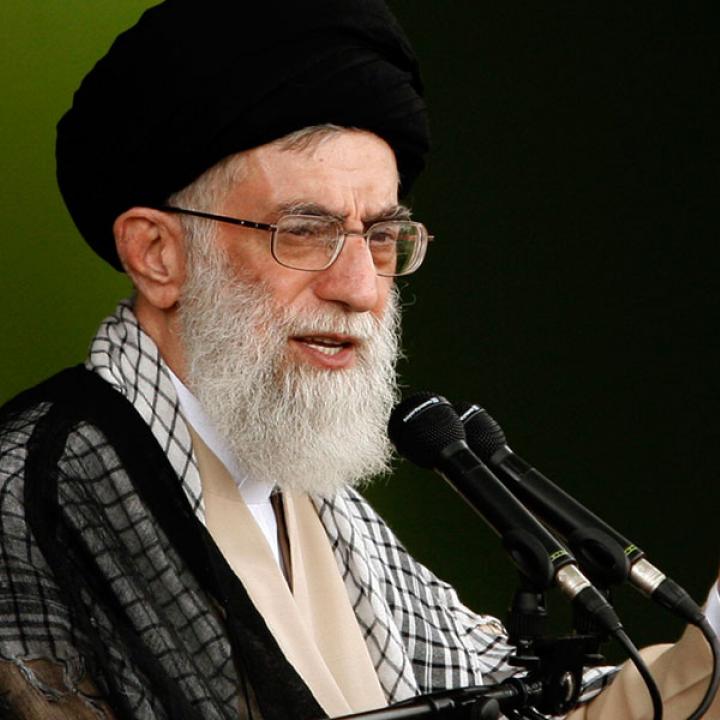
- Policy Analysis
- Policy Alert
Khamenei’s First Speech of 2021: Reemphasizing U.S. Weakness, Iranian Self-Reliance

Although the Supreme Leader left room for Biden to return to the nuclear deal and dialed down the vengeful rhetoric, his main message was that Iran cannot trust Washington when it comes to economic matters, security issues, or even coronavirus vaccines.
Every year, Supreme Leader Ali Khamenei gives a speech on the anniversary of the 1978 Qom uprising against the shah, the first in a series of addresses commemorating prominent moments in the Islamic Revolution. As with his other major annual speeches, he uses such occasions to signal domestic and foreign audiences about his approach to current events. Over the past decade, his Qom anniversary speeches have focused on explaining how the Iranian nation can resist the unified Western front against it and overcome great hardships on its way to “national independence.” This year’s January 8 address—delivered via television due to the country’s ongoing COVID-19 pandemic—reiterated these longstanding themes, with various updates reflecting recent developments at home and abroad.
The United States Is in a Weak Position
When protests occur inside the United States or Europe, Khamenei often uses them to argue that Western society and political systems are fragile. Predictably, then, he highlighted recent events in Washington as evidence that American democracy and human rights are eroding (“We can see what the big idol has turned into”). He also declared that the United States tried to start a civil war in Iran in 2009, and “now God has afflicted them with the same predicament in 2021.”
The ayatollah then took aim at those who believe that reconciliation with the United States will turn Iran into a “paradise.” After reminding listeners about how Iran looked before the revolution, when it had good relations with Washington, he told them to consider the present state of America’s “paralyzed” economy. In contrast, he argued, Iran has achieved many successes of late by resisting external pressure.
Iran Should Rely on Its Own Capabilities, Not Western Relief
In a November 23 speech, Khamenei emphasized that Iranians should not hope for foreign assistance or changed policies among Western governments. Instead, he instructed officials to improve the republic’s ability to face hardships on its own. He reiterated this stance today, stating that Tehran should prepare its economy for any scenario whether sanctions are lifted or strengthened. He also argued that the regime’s actions have gradually made sanctions ineffective.
Khamenei’s most extreme and paranoid take on self-reliance came when he declared that Iran will not be importing coronavirus vaccines from the United States or Britain, questioning their trustworthiness and efficacy. “If they knew how to make a vaccine, they would have consumed it themselves so they would not see that many deaths,” he alleged, then implied the West may try to use other countries as testing grounds. He cast doubt on France’s vaccine efforts as well, noting the country’s involvement in an infected blood scandal in the 1990s. Instead, he argued, Iran should buy vaccines from trustworthy nations or rely on its domestically developed variant, which is still being tested.
This strain of medical paranoia—which similarly infected his March 2020 Nowruz speech at the beginning of the pandemic—could prove deadly to untold numbers of Iranians. Hours after today’s speech, the Iranian Red Crescent Society announced that a shipment of 150,000 Pfizer vaccine doses was canceled.
U.S. Must Lift Sanctions Before Returning to the JCPOA
According to Khamenei, the regime is not “in a hurry” for Washington to return to the Joint Comprehensive Plan of Action. If Washington lifts its sanctions, he said, Iran will come back into full compliance with the JCPOA, but if sanctions are not lifted beforehand, then a U.S. return to the nuclear deal “may even be detrimental” to Iran. He then praised the Majlis and government for their “logical and wise” decision earlier this week to recommence enriching uranium to 20 percent, arguing, “When they don’t abide by any of their JCPOA commitments, it’s nonsensical for Iran to abide by all its commitments” (for explanations of this and other technical issues, see The Washington Institute’s Iran Nuclear Glossary). Khamenei also reminded his audience that the United States will need to compensate Iran for the damages it has endured since President Trump withdrew from the JCPOA in 2018.
Iran’s Regional Presence and Missile Capabilities Are Non-Negotiable
Khamenei repeated the notion that any future talks with the West should be limited to the nuclear issue. In his view, Washington is the one trying to destabilize the region, while Tehran is a stabilizing actor that is “duty bound” to reinforce its friends in the region. Hence, he promised that Iran’s regional presence “will continue to exist.”
Similarly, Khamenei characterized the missile program and other military efforts as “defensive” capabilities, claiming that the West wants Iran to be in a “defenseless” position wherein enemies “would dare to bomb our cities” like Saddam Hussein did in decades past. By improving its missile arsenal and other systems, he argued, Iran can deter its enemies and force them to take the regime’s capabilities into account.
Lastly, Khamenei thanked the people of Iran and Iraq for commemorating the one-year anniversary of Gen. Qasem Soleimani’s death, claiming that their actions were a manifestation of a wider popular movement in support of the regime’s policies. He also eulogized two other recently departed figures—nuclear scientist Mohsen Fakhrizadeh, killed in a November ambush, and hardline cleric Muhammad Taqi Mesbah-Yazdi, who died earlier this week—saying they both left valuable legacies that must be preserved and expanded. Yet despite previous calls to avenge Soleimani and Fakhrizadeh, Khamenei did not take a vengeful tone in the Qom speech—perhaps a signal that Tehran is waiting to see how the new U.S. administration will shape its regional policy and behavior toward Iran and the JCPOA.
Omer Carmi, a former visiting fellow at The Washington Institute, previously led IDF analytical and research efforts pertaining to the Middle East.


